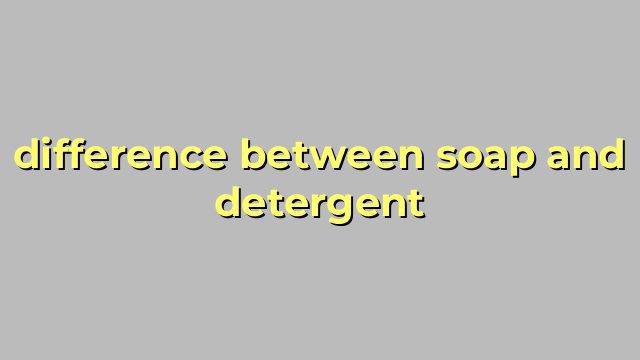Understanding the Difference between Soap and Detergent
When it comes to cleaning our clothes, dishes, or even our bodies, we often rely on soap or detergent to get the job done. While they might seem similar in function, there are actually some significant differences between the two. Here is a closer look at what distinguishes soap from detergent:
Composition:
Soap and detergent are two distinct types of cleaning agents that utilize different chemical compositions. Soap is generally made from natural materials such as vegetable oils or animal fats, and it is created through a process called saponification. Detergents, on the other hand, are synthetic compounds that are usually derived from petroleum. They are produced through complex chemical reactions that involve multiple steps.
Functionality:
While both soap and detergent are designed to clean, they do so in slightly different ways. Soap works by loosening dirt and grime from surfaces, allowing water to wash it away. This is because soap molecules have both hydrophilic (water-attracting) and hydrophobic (water-repelling) properties, which enables them to interact with both water and oil-based substances. In contrast, detergent molecules are specifically designed to attach to dirt and oil particles and suspend them in the water so that they can be rinsed away.
Environmental Impact:
The environmental impact of soap and detergent use can differ greatly. Since soap is made from natural ingredients, it is biodegradable and less harmful to marine life. Many detergents, on the other hand, contain harsh chemicals and can cause pollution and harm to aquatic ecosystems. However, there are now many eco-friendly and biodegradable detergent options available that are gentler on the environment.
Conclusion:
Ultimately, the choice between soap and detergent comes down to personal preference and use case. While soap is a more natural and environmentally-friendly option, detergents are generally more effective at removing tough stains and dirt. However, both soap and detergent fulfil the crucial role of keeping our homes and bodies clean and hygienic.
Table difference between soap and detergent
| Criteria | Soap | Detergent |
|---|---|---|
| Main Ingredient | Fatty acids and oils obtained from plants or animals | Chemical compounds derived from petroleum or vegetable oil |
| Properties | Biodegradable, eco-friendly and non-toxic | Non-biodegradable, harmful to the environment in high concentrations and toxic to aquatic life |
| Cleaning Power | Less effective in hard water, as it forms precipitate | Effective in hard water, as it does not form precipitate |
| Uses | Commonly used for personal hygiene and household cleaning | Commonly used for industrial cleaning purposes |
| Price | Relatively expensive compared to detergent | Relatively inexpensive compared to soap |
